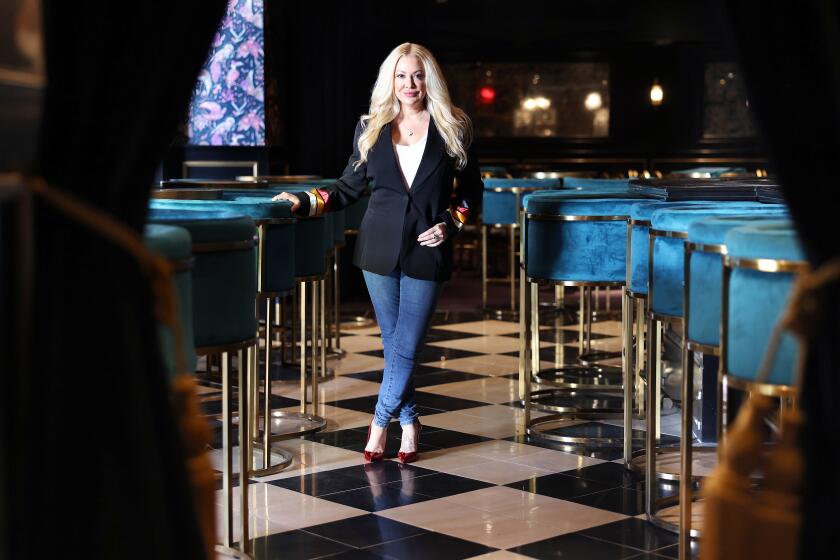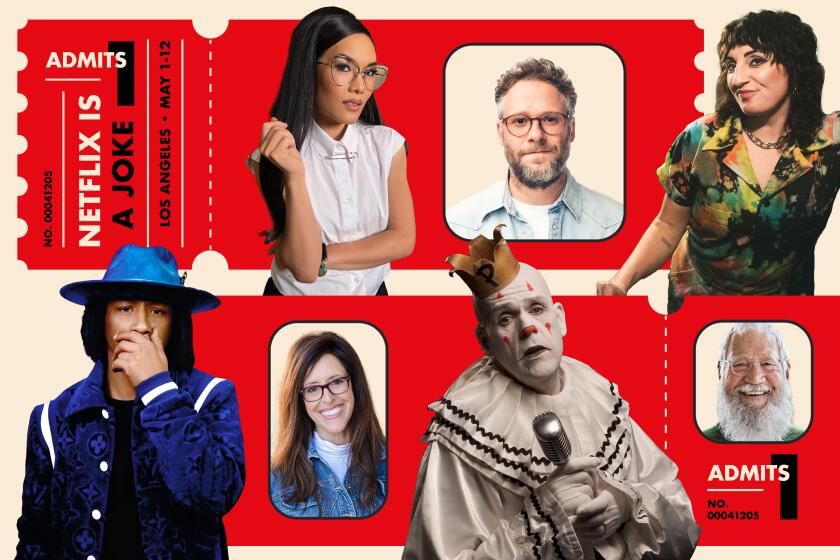Hollywood celebrities Twitter between takes
Some of the actors on NBC’s drama “Heroes” are among those in Hollywood who may have the superpowers to help Twitter break into prime time.
Greg Grunberg, who plays a Los Angeles cop with the ability to hear people’s thoughts, pulls out his iPhone nearly everywhere, including between takes on the studio lot, to tap out the short Twitter messages known as tweets. He broadcasts them to the more than 20,000 friends and fans following him.
A tweet Grunberg sent Sunday morning about season three winding down -- “Tough to say goodbye to crew not knowing if any or all of us will return next year” -- sent a cold chill through the show’s fandom. Within three minutes, their worried messages prompted him to clarify that the show “IS coming back” for a fourth season, “but some crew take other jobs, so it’s tough.”
For the most part, glam -- not geek -- still rules show business. Twitter is on the front edge of Internet innovation that’s starting to change that. It allows users to send blurbs of as many as 140 characters to everyone in their network via text messages or the Web, and to sign up to follow people who interest them.
Grunberg isn’t the only Hero on Twitter. Brea Grant, who plays his romantic interest Daphne Millbrook, is there. So are James Kyson Lee, who plays Ando; David H. Lawrence, who played villain Eric Doyle; and even the show’s makeup artist and prop master.
“It’s an official time-passer on the set,” Grant said.
The ranks of Twitter-using show business people are swelling: married actors Ashton Kutcher and Demi Moore Kutcher; “The Office” star Rainn Wilson; “The Closer” creator James Duff; Emmy-winning TV director Greg Yaitanes, who invested in the company; and talk show host Jimmy Fallon, among many others.
Twitter hasn’t quite hit the mainstream yet, but it’s one of the fastest-growing online services. Thirtysomething Internet entrepreneurs Evan Williams, Biz Stone and Jack Dorsey run Twitter, which started as a side project inside a podcasting company called Odeo Corp. Twitter became a separate company in 2007, and its 30 or so employees now work out of a San Francisco loft.
Twitter faces growing questions about how it will make money, since it doesn’t run advertising or charge for accounts. Its regular outages have become a running joke among its users.
Still, Twitter’s star is on the rise. The company’s founders turned down a $500-million buyout offer from social networking giant Facebook Inc. in November and closed a $35-million round of venture capital funding last month.
The service attracted 2.6 million U.S. Web users in January, a sharp increase from only 178,000 a year earlier, according to research firm ComScore Inc. And that doesn’t include the many more people accessing the service through mobile devices or the Twitter application that runs on Facebook and other websites.
Laura Roeder, a Los Angeles consultant who persuaded Grant to try Twitter, says too many actors allow fan sites or celebrity media to define them. She recommends that they use Twitter and other online tools to take ownership of their online identities and talk directly to their fans. “The more exploitative the celebrity press gets, the more Hollywood will realize this is needed,” Roeder said.
Grant, who sends tweets several times a day to her nearly 13,000 followers, says Twitter has helped build her brand and reputation. “I think it’s good for people to see that we are real people who have real emotions and do real things,” she said.
Grunberg logs on from home to get feedback after “Heroes” airs. “It’s the same feeling I would get if we performed in a 99-seat theater,” he said. “We may have 10 million people watching an episode, but I can’t really feel that. I can feel the immediacy of the reaction on Twitter.”
Those celebrities who are genuine, rather than simply using Twitter as a public relations tool, are able to attract and keep a following, said Felicia Day, an actress who has appeared on “Buffy the Vampire Slayer” and created a Web show called “The Guild.” She has more than 131,000 Twitter followers and says it’s “the best way to interact with a large audience.”
Or a small one. A director on such shows as “Heroes,” “Lost” and “House,” Yaitanes was one of the first in the TV business to use Twitter to market a show: his Fox series “Drive.”
Now he uses Twitter to keep track of his friends when he’s putting in 14 hours a day on the set. That way, the small network of writers, directors and producers can stay connected and share snippets.
“Because of the gypsy nature of the work, it makes it hard to keep up with people on different shows,” Yaitanes said.
One of those people is Duff, executive producer of “The Closer.” He likes being able to give his friends “a window into what I am doing, a little haiku about the day.”
Duff also signs up to follow strangers because he’s curious about their lives and experiences. “I feel like I am a little bit more connected to the collective unconscious than I was before,” he said.
Grunberg, a veritable tweet factory, keeps finding new uses for Twitter. It helps him raise awareness and money for epilepsy research, a cause close to his heart because his son suffers from the condition. He even started a business to create a free iPhone application called Yowza with two men he befriended on Twitter but hadn’t met in person.
Sometimes Grunberg finds himself twittering until late into the evening. His wife shakes her head, but he insists not one moment is wasted. “People are constantly thanking me for being on Twitter,” Grunberg said. “I say, ‘Thank you.’ It’s so cool.”
--
More to Read
The biggest entertainment stories
Get our big stories about Hollywood, film, television, music, arts, culture and more right in your inbox as soon as they publish.
You may occasionally receive promotional content from the Los Angeles Times.






